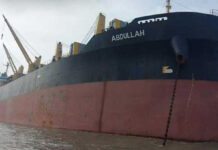What’s the first country you think of when it comes to global peacekeeping? The U.S.? Canada or Italy (placate with pasta)? If so, you are wrong. Bangladesh, a crowded developing nation, is the world’s largest donor of troops to the U.N. peacekeeping forces. According to the U.N.:
Americans? Only 80. This South Asian nation’s heavy role in peacekeeping — Bangladeshi soldiers make up almost a tenth of the total U.N. troops — is surprising. But it turns out Bangladesh has been topping the list of U.N. troops donors for 26 years, alongside other developing countries like Pakistan and India. Last September, when Joe Biden convened a meeting on strengthening U.N. operations, Bangladesh was a co-host. It’s gotten so good at peacekeeping it now trains other countries’ troops.
But why would a poor nation be so keen to send troops to the world’s most dangerous regions? Well, it depends who you ask. The official story line goes as follows: Bangladesh has a long commitment to peace and sees U.N. peacekeeping as a way to improve the country’s image and increase its soft power, says Rashed Zaman, professor of international relations at the University of Dhaka. Plus, being the world’s watchdog gives Dhaka extra diplomatic leverage within the U.N. system, he adds.
Having peacekeepers abroad may also help keep the peace at home. As Zaman points out, the Bangladeshi military has a nasty history of disrupting the local political process. So after several military coups in the 1970s and ’80s, he says, Bangladesh’s political parties now believe the armed forces’ involvement in peacekeeping missions “will imbibe them with democratic values.”

But many see a much simpler motivation behind Bangladesh’s peacekeeping efforts: money. Bangladeshi military salaries are much lower than U.N. ones, which means the country makes a profit by paying soldiers local salaries and pocketing the difference. While the average starting salary for a 26-year-old soldier in Bangladesh is $193, the U.N. average is $1,028, not counting equipment.
According to the Bangladeshi government, between 2001 and 2010, the country received $1.28 billion from the U.N. as compensation for its peacekeeping operations. Between 2012 and 2013, another $72 million was earned through salaries, equipment and other types of compensation. In total, that’s 1 percent of the GDP of a country where almost a third of people live under the poverty line.
To be sure, there is something morally questionable about wealthy countries like the U.S., Japan and Great Britain footing the yearly $7 billion bill for U.N. peacekeeping, but letting poor nations send their men to fight and die in the name of world peace. In the past two decades, Bangladesh has lost more than 120 soldiers in various peacekeeping missions. But Bangladesh seems happy with the deal. The Bangladeshi authorities may criticize Western countries for not sending more troops on U.N. missions, says Richard Gowan, a fellow at NYU’s Center on International Cooperation and an expert on global governance, “but the last thing they want is for NATO countries to send lots more peacekeepers and reduce the U.N.’s need for Asian personnel.” The government did not respond to repeated requests for comment.
Bangladesh may not stay the largest troops donor forever — the U.N. keeps asking for increasingly sophisticated technology, and it may struggle to meet the requirements. But for now, this troubled nation remains the world’s unsung peacekeeping champion.










A VERY INSPIRING & HEARTENING STORY. WELL DONE MY MEN/WOMEN IN UNIFORM.